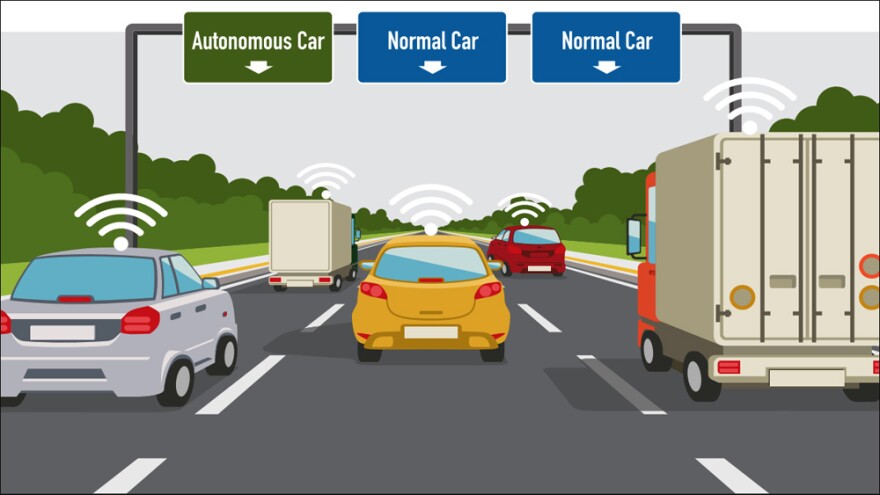Self-driving cars would one day take over Interstate 5 to the exclusion of human drivers under a proposal aired out before Washington state transportation advisors Tuesday.
High tech investors in the Seattle area hatched the idea to gradually convert Interstate 5 into a corridor for autonomous vehicles. Their proposal envisions smoother, safer travel between Seattle and Vancouver, BC, with the possibility to expand south to Portland later.
Consultant Scott Kuznicki of the Transpo Group and Cascadia Center think tank Director Bruce Agnew on behalf of Madrona Venture Group Managing Director Tom Alberg presented a tentative timeline to the Washington State Transportation Commission.
They said autonomous cars should first get to use the carpool lane and then get their own lanes beginning in 2025.
"If this technology goes the way that leading experts are predicting, we could see the entire corridor as a freeway could be autonomous by 2040,” Kuznicki said.
At that point, human drivers would only be allowed on low traffic nights and weekends. ?
The state policy advisors gave the idea an interested hearing, but the decision making authority lies elsewhere. It falls to Washington and British Columbia legislators to decide when and if the rules of the road will change. They’ll get briefed in the near future.
"It's very thought provoking obviously and a lot of questions emerge," said Washington State Transportation Commission Executive Director Reema Griffith. "For us, in the backdrop is how do you pay for this stuff? It's great and it's cool, but the funding is going to be the driver of how this moves. Then the other piece is, how do you bring everyone together to start thinking about all the implications it has... on users of the highways."
?The most skeptical view came from a commissioner whose day job is at the environmentally-minded Transportation Choices Coalition. Policy analyst Hester Serebrin said dedicated autonomous vehicle lanes would have "social equity implications" since the properly equipped vehicles might not be affordable to lower income folks.
?Kuznicki predicted cars capable of fully autonomous driving would be on the road in the near future, but it would take 20 years "to see turnover of the vehicle fleet" to the extent that it would make sense to exclude human drivers from the majority of the highway.
?The "vision paper" sponsored by the Madrona Venture Group, which Kuznicki and Agnew distributed in Olympia, called on decision makers to begin the incremental phase-in now. ?
"Taking bold, proactive action to improve the flow of people and goods along the Cascadia Corridor will allow us to begin to reap the benefits of improved transportation systems in the next few years without waiting for the construction of major new transportation infrastructure projects and their attendant massive costs and time delays," the paper's authors wrote. "It will also send a message that Seattle and Vancouver embrace new ideas and new ways of thinking, further cementing a reputation for innovation in the Cascadia Corridor."
?Madrona Venture Group, a venture capital firm based in Seattle, has invested in a number of area companies that make components or software for autonomous vehicles including Echodyne, Mighty AI and Impinj.


